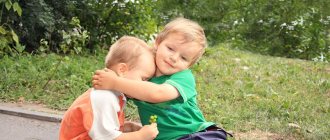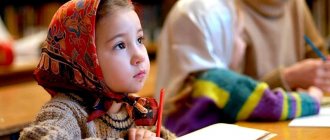Features of social and moral education of preschool children
The social and moral education of children begins from the first years of life and is based on the formation of positive human qualities.
A child in preschool age should be instilled with moral qualities through work activity, creativity and playful forms of education. In the process of communication in preschool institutions, the child shows his character, develops social and moral qualities, positions himself as a citizen and determines his position in society.
In order for the social and moral education of preschool children to be effective, it is necessary to carry out systematic educational work with children. Labor activity plays an important role in the education process, during which the child develops, achieves his goals and improves his skills.
The social and moral education of children should be implemented in close interaction between parents and teachers of preschool educational institutions. The formation of a child’s social and moral qualities should be carried out within the framework of his social life and interaction in the children’s team.
MAGAZINE Preschooler.RF
Social and moral education of preschool children Kotelnikova Yu.A. MDOU "CINDERELLA", NOYABRSKCurrently, special attention is paid to the problem of socialization of preschool children, which is one of the components of the draft State Standard for Preschool Education. Increased attention to the problems of socialization is associated with changes in socio-political and socio-economic living conditions, with instability in society. The relevance of social and moral education at the moment is enormous, because the objective sociocultural situation that has developed in society is characterized by a change in traditional moral norms and moral rules, an increase in stressful circumstances, a decrease in the stability of moral beliefs and attitudes, leading to undesirable consequences in the moral development of the younger generation in Russia: there is weak motivation for moral self-improvement; blurred criteria of good and evil; low level of development of the emotional and volitional sphere of the personality. In such conditions, the need for the education of a highly moral personality, capable of creating, and not just consuming, is increasingly felt. It is at this age that it is necessary to set moral guidelines for the child’s social development. Social and moral education is one of the most pressing and complex problems that must be solved today by everyone who is involved with children, since what we put into the child’s soul now will manifest itself later and become his and our life. The problem of inclusion in the social world has always been and now remains one of the leading ones in the process of forming a child’s personality. Historical analysis convinces of the need to provide a child with qualified assistance in the complex process of entering the human world. The socialization of a preschooler involves the development of the ability to adequately navigate the social environment available to him, to realize the intrinsic value of his own personality and other people, to express feelings and attitudes towards the world in accordance with the cultural traditions of society. The main goal of kindergarten teachers is to help children enter the modern world, which is so complex and dynamic. The problem of socialization of the individual in society is significant at this stage of development of pedagogical science, since the lack of adaptation of the individual in society leads to irreversible processes for both the individual and society. Issues of socialization of the individual are reflected in the studies of L.P. Bueva, V.A. Labunskaya, E.N. Sorochinskaya, D.I. Feldstein, E. Erikson and others. The authors affirm the position that the processes of socialization determine the ascension of the individual in social environment (B.P. Parygin), provide conditions for growing up (D.I. Feldshtein), mastering universal norms of relationships, accumulating social roles (T. Shibutani, E. Erikson), absorbing common values in the process of communicating with significant others ( T. Parsons) and others. In psychological and pedagogical research, social behavior is defined as mastering social relationships, “transferring them inside,” turning them into a function of the individual (L.S. Vygotsky); self-actualization among peers (L.I. Bozhovich); assignment by an individual of social norms, values, patterns of behavior (E. Erikson); multi-stage process of increment in the individual social (D.I. Feldshtein). Analysis of the research made it possible to identify the optimal conditions for nurturing an individual’s social behavior: • awareness of the child’s age-related capabilities (L.S. Vygotsky); • environment of interpersonal communication (L.I. Bozhovich); • formation of ideas about the norms and rules of behavior in society (E.N. Shiyanov); joint activities of adults and children (V.A. Labunskaya); • introduction to cultural values (D.I. Feldshtein). The pedagogical technology of social and moral education of children is carried out in stages: - collecting information about the individual personal characteristics of pupils; — long-term planning of work with children on social and moral education; — systematic work with children on social and moral education; — correction of existing socio-emotional problems. A large role in the successful social and moral education of preschoolers is played by a team of like-minded people, which is formed from the kindergarten administration, teachers, educational psychologist, physical education instructor, and music directors. Educators form children's ideas about the social world, about themselves, the people around them, nature and the man-made world, and cultivate social feelings and an active life position. Musical directors help in creating dramatizations, playing out situations using scenery and costumes. A teacher-psychologist works with children to master the language of emotions and correct aggressiveness; formation of self-confidence, social skills, moral consciousness. In order to ensure social partnership between preschool educational institutions and families, it is necessary to pay great attention to working with parents. To ensure close interaction between teachers and parents in the social and moral direction of working with children, it is necessary to draw up a plan of work with parents in this direction, and to familiarize parents with the work of the kindergarten, parent meetings, consultations, open classes, joint holidays, registrations in the “Parents Corner” are used " and etc.
Goal: – creating conditions in kindergarten that promote positive socialization of preschoolers. Tasks:. — creation of a favorable subject-development environment for the social and moral development of children; — creation of a unified system of work for the administration, teaching staff, medical staff of preschool educational institutions and parents for the social and moral education of children; — promotion of pedagogical knowledge on this issue to parents and involving them in participation in the pedagogical process; — improving the teacher’s communication style with children: adhere to a psychologically correct communication style, achieve the respect and trust of children; — formation in children of the foundations of the personality of a future citizen; High results in the social development of children are possible only if there are morally valuable relationships between adults, adults and children, with mutual concern between educators and parents about maintaining the authority of adults in the eyes of children. It is very important to organize a meaningful life for preschoolers at home and in kindergarten, filled with a variety of activities. Practice also shows that the effectiveness of social education increases when parents carefully listen to the advice of educators, and the latter study the best experience of family education and living conditions in the family. Social development in kindergarten is carried out comprehensively, but each child’s activity has specific features that create the opportunity for the most successful implementation of a particular task. Methods of social education turn out to be the most effective, contributing to the formation of unity between word and deed in preschoolers, when the teacher provides a simultaneous influence on the feelings and will of the preschooler, the organization of positive forms of behavior, with the expectation of the child’s awareness of initial social norms. In conclusion, I would like to note that social development is carried out in the sociocultural space in the course of introducing a person to cultural values, their appropriation and creation. In it, familiarization with culture, as a system of open problems, and its development and creation are associated with the realization of the individual’s subjective self and his cultural-creative function. The unilinearity of social development, identified with the assimilation and internalization of cultural values and dominant in many modern programs, leads to an impoverishment of the essence of the process itself, to a limitation of the creative capabilities of the developing personality, the formation of its subject activity. Culture is an external source, but it is powerless when internal sources and driving forces of development and self-development dry up. The effectiveness of social development is determined by the action of various factors. In the aspect of pedagogical research, the most important of them is education, the goal of which is familiarization with culture, its reproduction, appropriation and creation. Social development is possible only when a person not only repeats the social experience of previous generations that has developed and built on the basis of cultural values, but complements and deepens it with the creativity of the new.
| Next > |
The concept of moral education
Modern Russian society finds itself at the epicenter of moral and ethical problems.
The processes of globalization and universalization affect the culture of the country, the destruction of traditional national spiritual values occurs, as a result of this, social evil increases, as well as moral mistrust of each other intensifies, interpersonal and interethnic conflicts are perceived as a common occurrence, empathy disappears, a tendency is established to destroy national cultural traditions, the ideals of young people are reoriented from spiritual to material. The question of the ethical dimension of the negative consequences of imposing elements of Western living standards on our society remains relevant, which further aggravates the crisis of spirituality in Russian society. This can be seen in the devaluation of morality and moral imperatives, as well as in the absence of humane attitudes at the level of interpersonal relationships, thanks to which the full development of personality occurs.
Are you an expert in this subject area? We invite you to become the author of the Directory Working Conditions
Russian society, more than ever, requires the presence of a socially valuable and spiritually stable personality, a “moral person” with a high level of culture, capable of becoming a responsible, active, active subject of social development.
Among researchers there is no definition of the concept of “moral education”; they characterize it as:
- complex integrated process;
- the process of formation of moral qualities, character traits, skills and habits of behavior;
- a social phenomenon that obeys the laws of social development;
- purposeful influence of the older generation on the younger generation in order to develop stable moral qualities in them;
- a purposeful process of organizing and stimulating diverse activities and communication, aimed at mastering a moral culture of behavior and attitude towards the surrounding world;
- a process whose specific functions are carried out according to its own rules and patterns;
- the core of harmonious personality development;
- the form of transformation of experience and the sphere of implementation of human moral culture;
- development of skills and abilities of moral behavior, formation of humane relationships.
Finished works on a similar topic
Course work Moral education - goals, features, methods 490 ₽ Abstract Moral education - goals, features, methods 230 ₽ Test work Moral education - goals, features, methods 230 ₽
Receive completed work or specialist advice on your educational project Find out the cost






